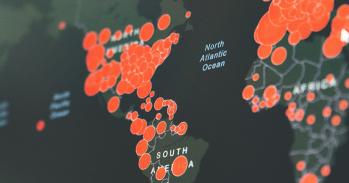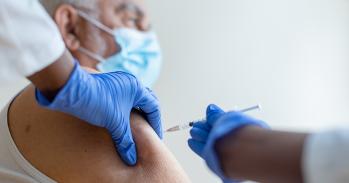
Before the COVID-19 outbreak, Sarah Caddy was conducting research on a number of different viruses. “I was looking at how antibodies can neutralise rotavirus and influenza, to help develop better vaccine candidates,” she says, “so it wasn’t a huge leap to extend my research to include coronavirus.”
Before the COVID-19 outbreak, Sarah Caddy was conducting research on a number of different viruses. “I was looking at how antibodies can neutralise rotavirus and influenza, to help develop better vaccine candidates,” she says, “so it wasn’t a huge leap to extend my research to include coronavirus.”
This article is part of a series in which we speak to some of the many Cambridge researchers tackling COVID-19. For other articles about our latest COVID-19-related research, click here.
I’m a clinical research fellow and veterinary surgeon in the new Cambridge Institute for Therapeutic Immunology and Infectious Diseases (CITIID) on the Biomedical Campus. Over the past few months I have divided my time between CITIID, and volunteering in the Department of Virology as part of the COVID-19 Genomics Consortium.
My initial role in the COVID-19 pandemic was related to diagnostics. I gained experience of testing patient samples for viruses during the Ebola outbreak in 2015 in Sierra Leone, so when COVID-19 cases started rising in the UK I volunteered to help the Public Health England lab in Addenbrookes. From there I joined Professor Ian Goodfellow’s team working to sequence full genomes of the virus from patients across East Anglia. As case numbers are being brought under control I’ve been able to transition back to virus research, which aims to improve our understanding of coronavirus immunity.
My research usually focuses on the antibody response to viruses. This means it hasn’t been too large a leap to extend my research to include coronaviruses. We need to determine how coronavirus-specific antibodies are working, in order to find out what the ‘ideal’ antibody response to SARS-CoV-2 is. This will be valuable for development of effective vaccines and for identification of people that may be susceptible to repeat infections.
As a veterinarian, I have also been closely following the news about COVID-19 in animals. There are many myths and misconceptions in this area, so I‘ve been actively engaged in reassuring veterinary professionals and the public about risks to pets. I’ve written a number of articles for The Conversation and the Naked Scientists on this in recent weeks (there’s still zero evidence of pets transmitting the virus to humans). With support from colleagues in CITIID, I have also established a new project for COVID-19 testing in animals.
Development of safe, effective, and widely available vaccines is an incredible challenge facing scientists right now. Many different vaccine approaches are being studied, but we don’t yet know which is going to be successful. The number of trials currently underway for SARS-CoV-2 vaccines is beyond anything the vaccine field has previously seen.
I have always been keen to seen molecular biology translated for use in medical settings. There is now cross-talk between research institutes and the hospitals like never before, and the scientists and clinicians are collaborating at an impressive rate!
Many lessons have been learnt about our ability and capacity to test for viruses in the UK. The number of scientists wanting to volunteer to help with testing has been immense, so in future I hope logistics and organisation will be able to match this enthusiasm much quicker.
When the pandemic is over, I’m looking forward to travelling anywhere outside of Cambridge! Much as I love this city, I really miss venturing further afield to see family, friends, and explore new places. I’d also really like to sit in a busy café with a good coffee!
Sarah Caddy is a Wellcome Trust Clinical Research Fellow in Viral Immunology at the Cambridge Institute for Therapeutic Immunology and Infectious Disease.
How you can support Cambridge’s COVID-19 research

The text in this work is licensed under a Creative Commons Attribution 4.0 International License. Images, including our videos, are Copyright ©University of Cambridge and licensors/contributors as identified. All rights reserved. We make our image and video content available in a number of ways – as here, on our main website under its Terms and conditions, and on a range of channels including social media that permit your use and sharing of our content under their respective Terms.




